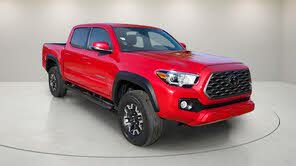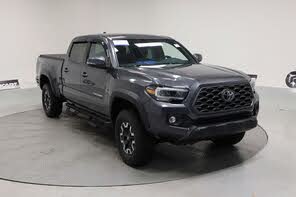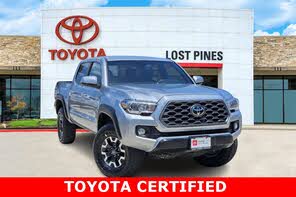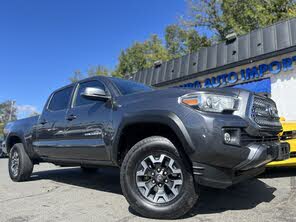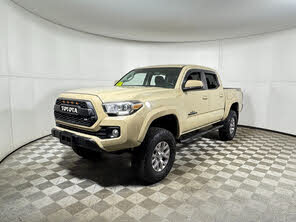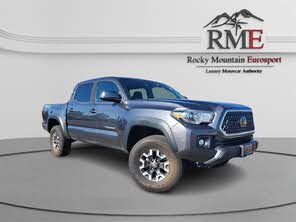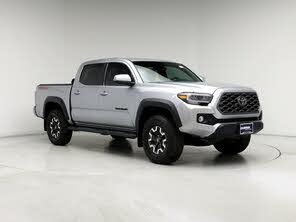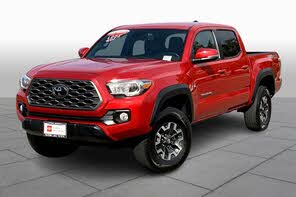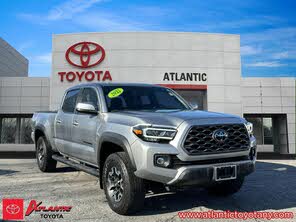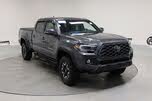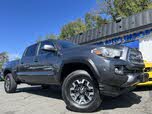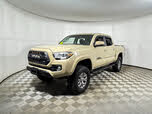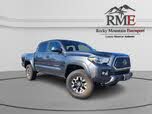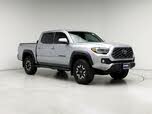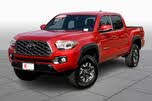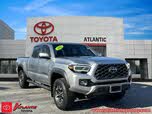Toyota Tacoma TRD Off Road vs Chevrolet Colorado ZR2
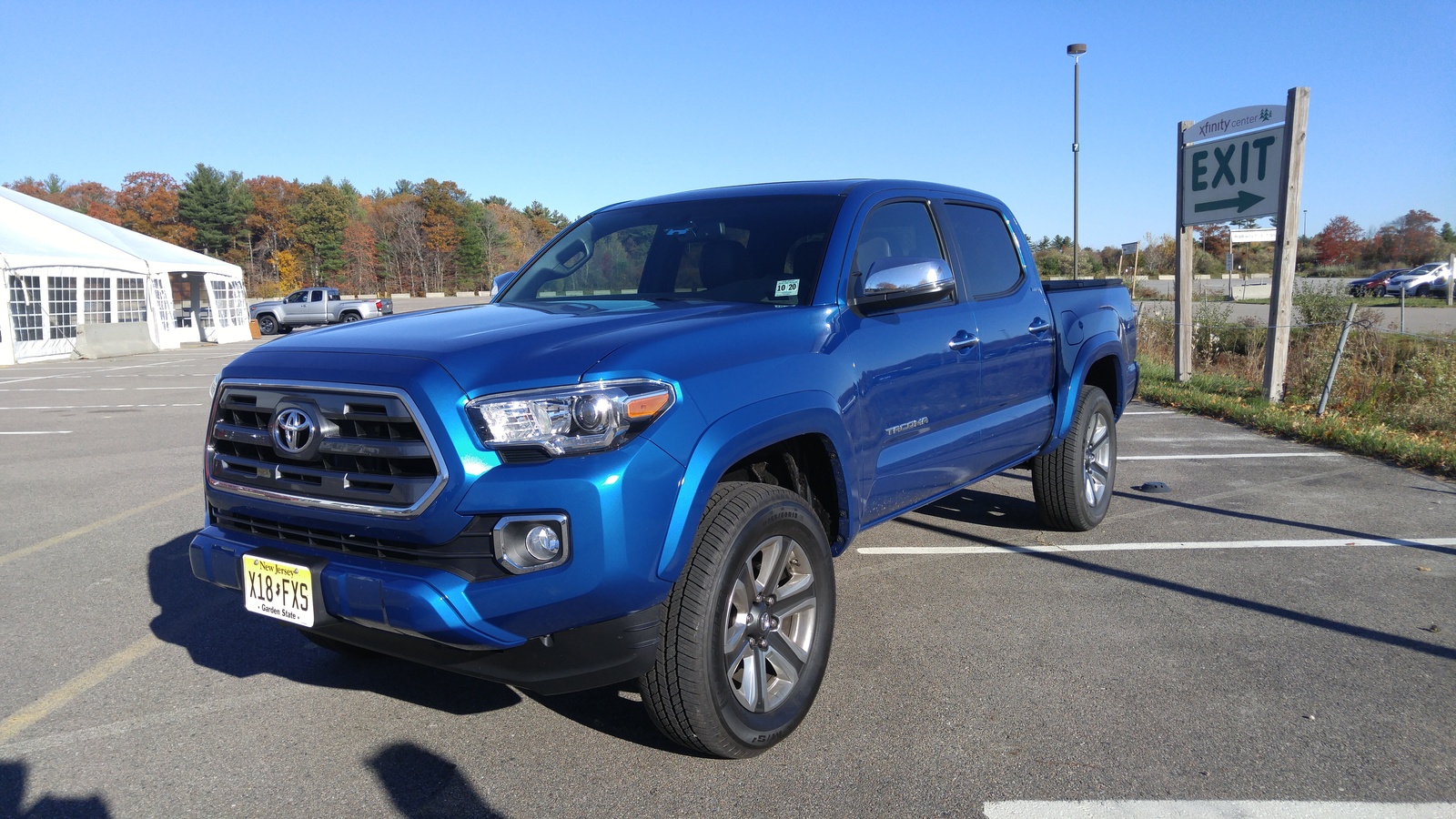 Toyota Tacoma TRD Off Road $25,850MSRP | 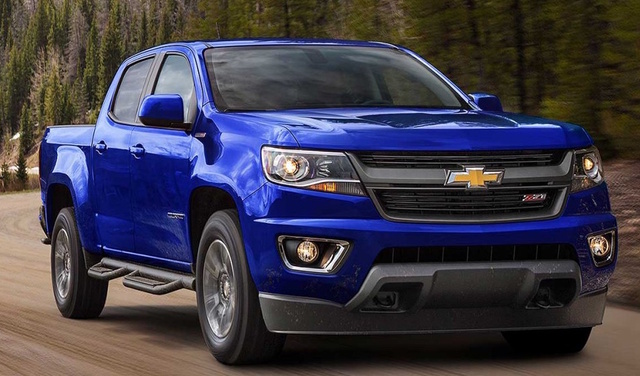 Chevrolet Colorado ZR2 $21,300MSRP |
Toyota Tacoma TRD Off Road $25,850MSRP | Chevrolet Colorado ZR2 $21,300MSRP |
|---|
Overview | |
Years produced2016-2019 | Years produced2017-2019 |
MSRP$25,850 | MSRP$21,300 |
Average price$29,577 | Average price$28,740 |
Listings3726 | Listings3199 |
Ratings & Reviews | |
User Reviews | User Reviews |
Popular Features & Specs | |
Engine2.7L 159 hp I4 | Engine2.5L 200 hp I4 |
Drive Train4X2 | Drive Train4X2 |
Seating Capacity4 | Seating Capacity2 |
Horsepower159 hp @ 5200 rpm | Horsepower200 hp @ 6300 rpm |
MPG City20 | MPG City20 |
MPG Highway23 | MPG Highway26 |
Engine | |
Engine Name2.7L 159 hp I4 | Engine Name2.5L 200 hp I4 |
Torque180 lb-ft @ 3800 rpm | Torque191 lb-ft @ 4400 rpm |
Horsepower159 hp @ 5200 rpm | Horsepower200 hp @ 6300 rpm |
Drivetrain4X2 | Drivetrain4X2 |
Fuel Economy | |
MPG City20 | MPG City20 |
MPG Highway23 | MPG Highway26 |
Interior | |
Seating Capacity4 | Seating Capacity2 |
Safety | |
Front Crash Overall | Front Crash Overall4 |
Side Crash Overall | Side Crash Overall5 |
Dimensions & Capacity | |
Bed Length73.7 in | Bed Length74.0 in |
Curb Weight3980 lbs | Curb Weight3945 lbs |
Height70.6 in | Height70.4 in |
Length212.3 in | Length212.7 in |
Width74.4 in | Width83.9 in |
Wheelbase127.4 in | Wheelbase128.3 in |
Maximum Payload1620 lbs | Maximum Payload1426 lbs |
Number of doors4 | Number of doors4 |
Maximum Towing Capacity3500 lbs | Maximum Towing Capacity3500 lbs |
Standard Towing Capacity | Standard Towing Capacity3500 lbs |
 Toyota Tacoma TRD Off Road $25,850MSRP |  Chevrolet Colorado ZR2 $21,300MSRP |
Toyota Tacoma TRD Off Road $25,850MSRP | Chevrolet Colorado ZR2 $21,300MSRP |
|---|
Overview | ||
Years produced | 2016-2019 | 2017-2019 |
MSRP | $25,850 | $21,300 |
Average price | $29,577 | $28,740 |
Listings | ||
Ratings & Reviews | ||
User reviews | ||
Popular Features & Specs | ||
Engine | 2.7L 159 hp I4 | 2.5L 200 hp I4 |
Drive Train | 4X2 | 4X2 |
Seating Capacity | 4 | 2 |
Horsepower | 159 hp @ 5200 rpm | 200 hp @ 6300 rpm |
MPG City | 20 | 20 |
MPG Highway | 23 | 26 |
Engine | ||
Engine Name | 2.7L 159 hp I4 | 2.5L 200 hp I4 |
Torque | 180 lb-ft @ 3800 rpm | 191 lb-ft @ 4400 rpm |
Horsepower | 159 hp @ 5200 rpm | 200 hp @ 6300 rpm |
Drivetrain | 4X2 | 4X2 |
Fuel Economy | ||
MPG City | 20 | 20 |
MPG Highway | 23 | 26 |
Interior | ||
Seating Capacity | 4 | 2 |
Safety | ||
Front Crash Overall | 4 | |
Side Crash Overall | 5 | |
Dimensions & Capacity | ||
Bed Length | 73.7 in | 74.0 in |
Curb Weight | 3980 lbs | 3945 lbs |
Height | 70.6 in | 70.4 in |
Length | 212.3 in | 212.7 in |
Width | 74.4 in | 83.9 in |
Wheelbase | 127.4 in | 128.3 in |
Maximum Payload | 1620 lbs | 1426 lbs |
Number of doors | 4 | 4 |
Maximum Towing Capacity | 3500 lbs | 3500 lbs |
Standard Towing Capacity | 3500 lbs | |
The 2019 Toyota Tacoma presented a distinctive ruggedness, with each trim offering a unique blend of design elements like different grilles, wheels, hoods, and finishes. The overall aesthetic seemed to have been crafted with precision tools, giving it a robust, angular appearance characterized by solid metal blocks, sharply carved character lines, flared fenders, and a prominent front nose. This design approach rendered the Tacoma a ruggedly handsome appearance.
Inside, the Tacoma favored functionality with its extensive use of durable plastics, reflecting its utilitarian intent rather than luxury. The cabin featured geometric upholstery patterns and symmetrically arranged air vents that added a touch of style amidst the otherwise straightforward interior design. The truck boasted simple analog gauges and a traditional control panel with large, glove-friendly knobs and buttons. The interior layout was practical, especially with options across extended-cab (Access Cab) and crew-cab (Double Cab) configurations, and varied cargo bed lengths.
In contrast, the 2019 Chevrolet Colorado adopted a more understated aesthetic. The model reviewed, a Midnight Edition Colorado Z71, came in a striking all-black theme that, while stylish, was noted for its challenge to maintain cleanliness. The Colorado’s design avoided overly dramatic cues except in its more rugged ZR2 version, which combined aesthetic form with functional off-road capabilities. The interior of the Colorado was straightforward, with an emphasis on practicality and ease of cleaning, utilizing simple, basic materials that were nevertheless susceptible to wear and tear from regular use.
The 2019 Toyota Tacoma was primarily powered by a 3.5-liter V6 engine, delivering 278 horsepower and 265 pound-feet of torque. This setup was complemented by a 6-speed automatic transmission with a Sport mode and manual shift capabilities, especially tailored for various off-road conditions through advanced systems like Multi-terrain Select and Crawl Control. Despite its robust capabilities, the Tacoma's ride quality on pavement was less than smooth, characterized by a responsive yet stiff steering and a ride that felt both disconnected and overly reactive to road inconsistencies. The fuel efficiency during tests hovered around 20 mpg, aligning closely with EPA estimates.
The Chevrolet Colorado offered a range of engines, from a basic 200-horsepower, 2.5-liter four-cylinder to a more powerful 308-horsepower, 3.6-liter V6, and even a 181-horsepower, 2.8-liter turbo-diesel, which boasted 369 pound-feet of torque. The Colorado’s driving dynamics were described as sluggish at low speeds due to throttle response, but it stabilized into a more confident and solid ride once in motion. The Colorado excelled in towing capacity and handling, particularly with the Z71’s off-road suspension and robust Goodyear Duratrac tires, though its performance was hampered by a deep front spoiler and optional side steps that affected its trail capabilities.
The Tacoma's cabin access varied with height due to its elevated stance coupled with a surprisingly low roofline, which could pose challenges for taller individuals. The interior was practically laid out with numerous storage options and a focus on straightforward functionality. Seating was basic, with manual adjustments and effective air conditioning but lacked more sophisticated comforts like seat ventilation. The rear seating was cramped, typical of midsize trucks, with limited under-seat space and no dedicated air vents or USB ports.
Conversely, the Colorado prioritized functional simplicity in its cabin, with easily accessible controls and power-adjustable front seats enhancing comfort. The interior also featured durable materials suited to both work and leisure activities, though rear seating remained tight. Storage solutions were abundant, and the truck included thoughtful touches like corner-step bumpers and an EZ Lift and Lower tailgate for easier cargo management. Despite its practical interior, the lack of rear air vents was a noted omission.
Technology in the Tacoma was minimalistic, with the top-tier infotainment system lacking in intuitive navigation and connectivity features like Apple CarPlay, which were planned for future models. The system’s interface and usability were not as refined, with cumbersome controls that were not glove-friendly.
The Colorado, however, featured the Chevrolet Infotainment 3 system, which was praised for its user-friendly interface, mirroring the simplicity and intuitiveness of a smartphone. This system included modern necessities like Apple CarPlay, Android Auto, and optional navigation upgrades, although the physical tuning knob's functionality was criticized for its cumbersome operation.
Toyota equipped the Tacoma with its Safety Sense suite, offering a range of driver-assist technologies, although they were not the most cutting-edge versions. The truck performed well in safety tests but had some limitations in headlight performance and certain crash tests.
The Colorado was less equipped in terms of advanced safety technology, primarily offering basic features with additional options available only on higher trims. It scored lower in safety evaluations, particularly with its headlight performance and passenger safety in certain crash scenarios.
CarGurus highlights

According to CarGurus experts, the overall rating for 2019 Toyota Tacoma is 7.7 out of 10, while the 2019 Chevrolet Colorado scores 6.8 out of 10. Based on these ratings, the Toyota Tacoma is recommended for its blend of rugged style, off-road prowess, and superior safety features, making it the more advisable choice for those in the market for a reliable and capable midsize truck.
Choose the Toyota Tacoma TRD Off Road if:
- You value rugged styling and a strong off-road capability.
- You prefer a truck with advanced safety features as standard.
- You are looking for a vehicle with a higher resale value and reliability reputation.
Choose the Chevrolet Colorado ZR2 if:
- You prioritize a more powerful engine lineup and higher towing capacity.
- You prefer a more straightforward, user-friendly infotainment system.
- You are looking for a truck with a functional interior and practical features for everyday use.
CarGurus highlights

According to CarGurus experts, the overall rating for 2019 Toyota Tacoma is 7.7 out of 10, while the 2019 Chevrolet Colorado scores 6.8 out of 10. Based on these ratings, the Toyota Tacoma is recommended for its blend of rugged style, off-road prowess, and superior safety features, making it the more advisable choice for those in the market for a reliable and capable midsize truck.
Choose the Toyota Tacoma TRD Off Road if:
Shop Now- You value rugged styling and a strong off-road capability.
- You prefer a truck with advanced safety features as standard.
- You are looking for a vehicle with a higher resale value and reliability reputation.
Choose the Chevrolet Colorado ZR2 if:
Shop Now- You prioritize a more powerful engine lineup and higher towing capacity.
- You prefer a more straightforward, user-friendly infotainment system.
- You are looking for a truck with a functional interior and practical features for everyday use.

By: CarGurus + AI
At CarGurus, our team of experienced automotive writers remain at the heart of our content operation, conducting hands-on car tests and writing insightful guides that are backed by years of industry experience. To complement this, we are harnessing AI to make our content offering more diverse and more helpful to shoppers than ever. To achieve this, our AI systems are based exclusively on CarGurus content, ratings and data, so that what we produce is both unique to CarGurus, and uniquely helpful to car shoppers.
